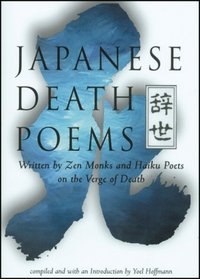Helpful Score: 2
My sister died last year following a decade-long battle with cancer. She was a very well-known writer and literary scholar, and also a serious amateur artist. During the later years of her life, she'd developed a strong interest in Buddhism. Visiting her apartment not long before her death, I found on her walls several print-on-silk hangings that she'd made. Each one displayed a short text, all related to dying. I learned that she'd chosen the lines from the book "Japanese Death Poems: Written by Zen Monks and Haiku Poets on the Verge of Death."
I didn't have occasion to read the book at that time, but when I visited her apartment again, a few weeks after her death, I found her copy of the book, with heavy under-lining and page-marking. That's when I read the book for myself. In addition to the poems she'd bookmarked (several of which I read at her memorial service) I found many others with striking images and perspectives. Although I left her copy of the book with her husband, who clearly felt attached to it, I resolved to get a copy for myself. I put it on my wish-list at PBS, and within a few months one became available.
As I read through it now, the experience is obviously enriched by all the associations with my sister's life and death. But I'm confident that a more `neutral' reader (but honestly, how `neutral' do you feel about your own inevitable death?) will find it a powerfully moving book, too. However much you think you understand the `philosophical detachment' of a Buddhist acceptance of death, the immediacy and evocative range of many of the poems in this book will help that understanding to lodge more deeply in your being.
I didn't have occasion to read the book at that time, but when I visited her apartment again, a few weeks after her death, I found her copy of the book, with heavy under-lining and page-marking. That's when I read the book for myself. In addition to the poems she'd bookmarked (several of which I read at her memorial service) I found many others with striking images and perspectives. Although I left her copy of the book with her husband, who clearly felt attached to it, I resolved to get a copy for myself. I put it on my wish-list at PBS, and within a few months one became available.
As I read through it now, the experience is obviously enriched by all the associations with my sister's life and death. But I'm confident that a more `neutral' reader (but honestly, how `neutral' do you feel about your own inevitable death?) will find it a powerfully moving book, too. However much you think you understand the `philosophical detachment' of a Buddhist acceptance of death, the immediacy and evocative range of many of the poems in this book will help that understanding to lodge more deeply in your being.




